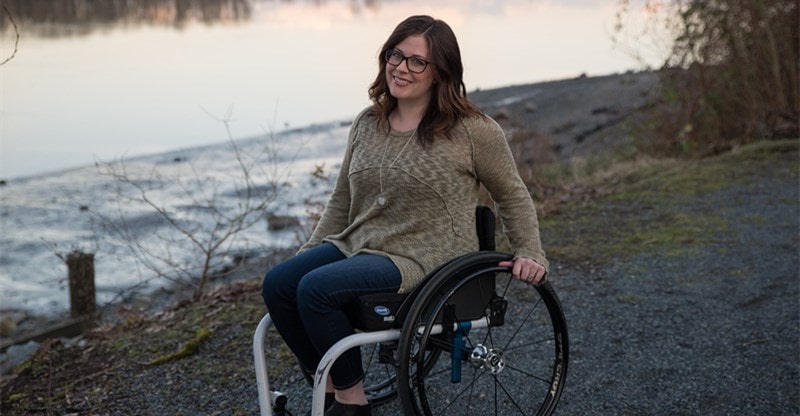Interview Confidence for Workers with Disabilities
No question, job interviews are stressful. Sweaty palms. Knots in the stomach. The works.
But facing a job interview when you have a disability can be even worse. You’ll need to show, explicitly or implicitly, that your condition won’t be a workplace liability.
And while confidence is key to acing an interview for any candidate, like it or not, if you have a disability, projecting confidence will be especially significant for you. We’ll show you how.
Candidate, Know Thyself
If you want to project confidence in your next job interview, then the first and most important thing that you can do is know yourself and the value that only you can bring to the company and the position.
But understanding the value you bring doesn’t just happen automatically. There are several things you can do to help cultivate a greater degree of self-confidence. One of the first is learning to quiet that negative inner voice that we all have, but that might grow especially loud when we’re trying to show our best and truest selves.
So take the time before your interview to begin thinking about your accomplishments and how these relate to the job you’re applying for. Consider how your experiences and your achievements have prepared you for this position. And then be prepared to articulate that in your interview.
And if you’re having trouble getting started, keep this in mind: only about 20% of job applicants ever reach the interview stage. So the fact that you’ve made it so far means that the recruiter already sees significant potential in you.
Dig a little deeper into researching the company and the job. Think about your experiences and your accomplishments and figure out how, specifically, these can contribute to the company.
After all, your recruiter obviously sees something in your background that makes them think you could be a good fit — otherwise, you wouldn’t have been asked to interview in the first place! So figure out what those attributes are and then be ready to play them up in the interview.
The more you understand the value you could bring to the company, and the more you rehearse that in your mind, the more confidence you will project in your meeting.
Be Real
Knowing your value doesn’t mean being arrogant, however. No one is perfect, and you’re not going to do yourself any good if you refuse to see or to acknowledge your weaknesses.
So when you’re preparing for your interview, try to consider your application from the perspective of your potential employer. You’ll also need to think about any concerns they might have. Prepare ahead of time to address those concerns in a way that is honest, thoughtful, and reassuring.
Consider what you might do in your new job to address and overcome those challenges and be ready to explain your plan. Your recruiter will be impressed by your thoughtful answers and your preparation. That means you’ll be going into the meeting feeling more confident. You won’t be so worried about getting caught off guard.
The Big “D” Discussion
If you have a visible disability, then you might feel like it’s the elephant in the interview room. By law, a recruiter isn’t permitted to ask you questions about your disability. They can only ask questions that relate directly to your ability to perform the job for which you’re interviewing.
That doesn’t mean, however, that you can’t bring it up. If you have an invisible disability, you might keep it to yourself unless it’s absolutely necessary. Unless you require accommodations, you need not disclose your disability. The key is to focus on solutions, not problems.
For instance, if you do decide to have the disability discussion with your recruiter, then there are some facts that you should know, facts that might well be useful in this potentially difficult discussion.
Case in point: most workplace accommodations cost less than $500. And yet research shows that companies that hire employees with disabilities generate 30% more revenue on average than those that don’t. That’s a pretty darn good return on investment, and it might just behoove you to make your interviewer aware of it!
Sweat the Small Stuff
If you’re interviewing in person, rather than remotely, and you have mobility challenges, then it’s a good idea to scope out the venue ahead of time. There’s nothing worse than showing up and realizing you’re going to have to walk so far, you’re late, flustered, exhausted, and in pain by the time you arrive.
According to the Americans with Disabilities Act (ADA), all public buildings are required to be accessible to persons who have disabilities unless the site is on the National Register of Historic Places, and therefore can’t be modified in a manner that might compromise its historic integrity. This means that all new constructions must be ADA compliant while existing construction must be retrofitted to ensure access by persons with disabilities.
If yours is one one the rare circumstances where the meeting space turns out not to be accessible, then reach out to your recruiter well in advance to come up with an alternative site for the interview, or to arrange for a remote interview instead.
And whether you’re interviewing face-to-face or online, take care to look the part. Dress appropriately for the workplace and the position. Make sure that you’re well-groomed, and if you’re video conferencing, make sure you’re in a quiet location with excellent video and no distractions in the background.
Again, paying attention to sure details ahead of time will help you be more poised, more relaxed, and, therefore, more confident when you meet your recruiter at last.
The Takeaway
When it comes to life’s most fun experiences, interviewing probably won’t even crack most people’s top 100 list. But it’s an inevitable part of adulting. When you’re interviewing as a candidate with a disability, though, you’re going to have to take a few extra steps to project the best, most competent, and more confident version of you!



